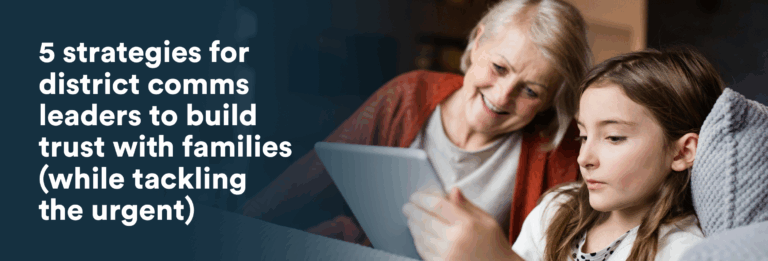Written by TalkingPoints
All families are struggling to adapt to the “new normal” of remote learning. This is especially true for families of students with learning differences. Many have been deprived of the usual routines and supports they get at school, including adapted curriculum and support from paraprofessionals, speech pathologists, and other critical providers. That’s why exceptional learners–and their families–need caring, dedicated teachers like you now more than ever.
Below, we’ve shared strategies and resources for serving students with learning differences as you transition to online teaching. We’ve also included tips for using TalkingPoints to support your exceptional learners and the people who care for them at home. We know this transition isn’t easy. But with this post, we hope to make it a bit easier to give your students–no matter their needs–the high-quality teaching and support they need to thrive.


Check in with families first
Sending a simple “how are you?” goes a long way. It lets families of students with special needs know that you care. It also helps you gather important information for building instructional and support plans for students.
When you check in with families, try to get a sense of how students are faring at home. Are they on a schedule? How are they spending their time? What have been their ups and downs? What supports are they getting remotely (i.e. speech) and which ones do they need?
Let families know you are working on a learning plan. Find out what materials they have at home and what resources they may still need, such as audiovisual or mobility devices.
TalkingPoints Tip: Not sure what tech or other supports your students with special needs have at home? Send a poll in TalkingPoints. Here’s a video that shows you how.
Create routines
Students thrive on schedules. This is especially true for students with learning differences such as autism. Even if you can’t duplicate a school schedule, finding ways to bring consistency to a student’s week can bring much-needed comfort, reduce stress, and make it possible for students to learn.
Try incorporating a preferred activity as part of a regular video session, or offer schedule ideas for families at home based on what you know about the student’s learning style. Even a simple check in each week at the same time can mean a lot!
If you video chat with a student, make sure to clear your space of distractions and give your undivided attention. Have an activity or lesson prepared for each session. Finally, remember to document this time if you are a service provider of a student with an Individualized Education Plan (IEP).
TalkingPoints Tip: Did you know? With TalkingPoints, you can schedule messages to go out at the same time each week. Help build routine and set expectations by scheduling regular messages with tips, activities, videos or just a hello. Learn how to schedule your messages with TalkingPoints.
Make your teaching accessible
Before assigning work, make sure all students can access it. Sending a document? Make sure the text is selectable and not “locked” or saved as an image (which prevents students from using text-to-speech or other assistive technology to access it). Sending a video? Check to make sure it has quality captions first.
TalkingPoints Tip: Sending videos and images to support written materials can help all students learn. With TalkingPoints, you can send both types of media–along with links to helpful resources for families of special education students. Here’s a quick video that explains how. (Also, if you’re recording a lesson on YouTube, include captions! Our Text-to-Speech feature makes it possible for all families and students to access the lesson that way).

Collaborate with support providers, colleagues and families
Students with learning differences benefit most when a team of people is there for support. Now more than ever, resource specialists, speech pathologists, paraprofessionals and other service providers all have critical roles to play to ensure students with learning differences are getting the help they need.
Lean on these support providers as you think about how to serve your exceptional students. Ask for input on what works for a student when it comes to scheduling or preferred activities. If you can, collaborate on lesson planning or trialling virtual tools to help students learn. (Chances are you’ll learn some great tips and tools that can help all students!)
Another great group to reach out to when it comes to helping exceptional learners: your colleagues. Other teachers may have successful virtual strategies to share when it comes to working with a student with learning needs.
But no one knows a student better than their family. Reach out to families to learn what tools, strategies, and rewards work best for their child.
TalkingPoints Tip: You can share a class with other teachers and support providers on TalkingPoints. That way, you can see each other’s messages and ensure smooth communication with families. Here’s our guide for how to share a class.
Teaching in a pandemic is overwhelming. We hope that these tips help make it a little easier to serve your highest needs students and give them the best education possible.. We’re confident you can–and we hope you’ll use TalkingPoints to help you! We’re here for you and appreciate all you do for all your learners.



